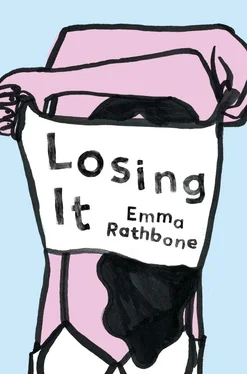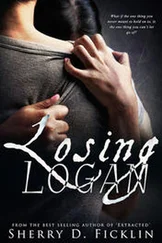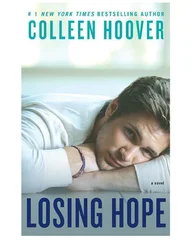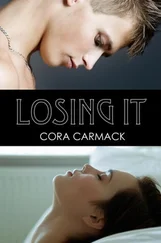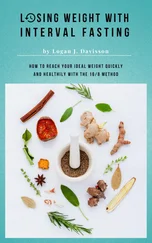Or maybe there was a scrim of need there, only detectable to men, that threw things off, jounced her out of the right rhythm. Maybe she was doing something — there was some quality that over the years had gone unchecked, become more pronounced, because you can’t see yourself from the outside — that caused her to stay single. That was when I started looking at Viv as a sort of specimen, when I began observing her with a more exacting eye. I had to know how she’d ended up like that, if there was something inherent there, from the beginning, a rogue mannerism or trait that leveraged her out of all of it.
I sat there scribbling on the edge of a piece of paper with a pencil, until the whole top half was dark and shiny with graphite and the corners curled.
Could it still happen? I could see her with someone, having some late-day romance, all worn and forgiving, like falling into an old baseball glove. And they could hold hands and listen to conch shells and he would be in love with her quiet and efficient ways. They could be like those old couples who didn’t expect to find each other but then they did, and they would look at each other knowingly from Adirondack chairs and you know they’re just fucking with abandon because they were too old to be insecure and were throwing everything against the wall at this point. I could see it. It was still possible. It had to be.

I knew I was going to do it from the moment I woke up and heard Aunt Viv’s car roll down the gravel driveway toward the street, but I still forced myself to take my time eating my cereal that morning. I glanced at the paper, sat on the already hot porch steps, and looked out toward the road. Without any conviction, I tried to work on my essay, picked up and studied a decorative papier-mâché pitcher that was on the top of the fridge, opened a cabinet in the dark sitting room, and looked at a set of dusty old poetry books. All the while it was welling up inside me — what I was going to do.
There’s nothing more quiet than an empty house at midday, a moonscape of chairs and vases. I stood outside Viv’s room and pushed the door open and it creaked. I stepped in. Cool, blue-tinted half-light came through the window. It smelled like her. I walked slowly across and looked out onto the front, the gravel driveway winding away.
Her bed was a wooden four-poster, an antique, with an expanse of cream-colored comforter. It was all tidy, airy, pleasant. There was a colorful, tattered oval rug on the floor. I felt that everything was so finely tuned, the strings pulled so tightly to achieve a specific chord of worn comfort, that she would know, immediately, that someone had been in there. But that’s ridiculous, I told myself.
On the table next to her bed was a copper vase and inside it were stalks of fake rustic-looking leaves, the kind of cheap thing you get at a craft store. On her bedside table were a decorative candle, a bracelet, and a careworn paperback mystery.
There were framed photos on the wall: a tired-looking couple standing in long grass in front of a shed; another showed three people next to a beat-up blue truck. One was Vivienne, probably a teenager, wearing a denim pantsuit. Her thick hair was tied partially back like a Greek goddess. The person next to her was my father — I hadn’t seen many pictures of him at that age, and it’s funny seeing the young, open faces of people you only ever knew as adults. And then the third person was another girl, taller and slimmer than Viv but obviously related, and I realized that it must be Ellen, the dead sister. They were all squinting into the distance, their noses making sundial shadows across their faces.
What was I expecting to find? I wasn’t sure. A diary, maybe, letters, anything that would give insight into her or her past.
Aunt Viv’s dresser was in a sort of feminine disarray, as if she’d been hurriedly searching for something before she left. There were decorative antique bottles. A silver dish contained a tangle of earrings and bracelets and hair bands. Necklaces hung from the mirror — heavy silver and turquoise things I hadn’t seen her wear. A snakeskin address book lay open, numbers and streets written in blunt pencil.
I opened one of the drawers to find a stack of neatly folded cotton underwear. Nestled next to it was a scented satchel that smelled of dry spices and cinnamon. Inside the other drawers were socks and nylons and a jewelry box with antique rings in velvet compartments. A long drawer at the bottom that spanned the width of the dresser contained a dusty and mothball-smelling zip-up plastic storage pouch holding some old frilly-looking garments and big gold costume brooches. Tucked in with the clothes was a stack of dusty old postcards, rubber-banded together. I took them out. One was completely black. “Dallas at Night,” it read. On the back was faded pen writing of someone named Carrie. “Your ‘favorite’ city misses you,” it read, and then talked about visiting an aquarium.
The phone rang and the sound crashed through the house. I knocked my wrist on the corner of a pulled-out drawer. Everything was still and quiet again and the call went to voice mail.
Next I went into the bathroom. It looked like it had been remodeled fairly recently as the faucets were modern silver and the shower was inlaid with sandy-looking tile. There were starfish decals on the wall and a seashell-shaped scented plug-in.
I looked quickly through everything. There were hard little European soaps under the sink — the kind of thing you get for free at a bed-and-breakfast, all collected and stowed in an orderly way. There was a stiff plastic bag filled with shower caps, a hatbox filled with layers of pastel-colored tissue paper. The medicine cabinet contained scissors in a plastic pouch, spotless nail clippers, Q-tips in a small jar, a stealthy razor in an embarrassingly pink dock type of thing.
There was another scented satchel by the sink, and a glass-doored cabinet above the toilet that held clean hand towels and some toilet paper. It was all so normal, blameless. I closed everything and left the room quickly, feeling like I hadn’t found anything out and instead had done some kind of unquantifiable, faraway damage to an organ I couldn’t see.

“Did you know?” I said to my mom.
“No,” she said. “Well, I suspected.”
I slammed the car door and stood in a vast, sweltering parking lot. I shielded my eyes from the sun. It was too hot in the car, and it was too hot out here. I needed to find shelter. I was in a gutted shopping center, where I’d seen online that there was a used-book store. All the shopfronts looked dark and closed, and mine was the only car. I walked quickly across the lot toward a bench in the shade under an awning.
I’d just told my mom about the conversation with Viv.
“Well, I mean, do you think she’s gay?”
“But I’m not surprised,” said my mom, in a musing way, ignoring what I’d just said.
“Why?” I said. “Why aren’t you surprised?”
“No, to answer your question, I don’t think she’s a lesbian. But I suppose anything’s possible.”
I heard some kind of drone start up over the phone.
“What is that?”
“It’s the fan,” said my mom. “I just turned it on.”
“How’s Costa Rica?” I said. “What’s it like?”
“So far it’s very nice,” she said in a patient tone, the tone she used when she was trying to sort through things in an incremental manner. One of my memories, the thing that I often flashed to when I thought of my mom, was her sitting at our kitchen table in Texas, moving pieces of macaroni across the surface to indicate the steps in some process she was about to enact to remedy a problem at work. “We’ll call the warehouse. Then we’ll speak to Harry Comstock. Then we’ll think about the price point.”
Читать дальше
Конец ознакомительного отрывка
Купить книгу
